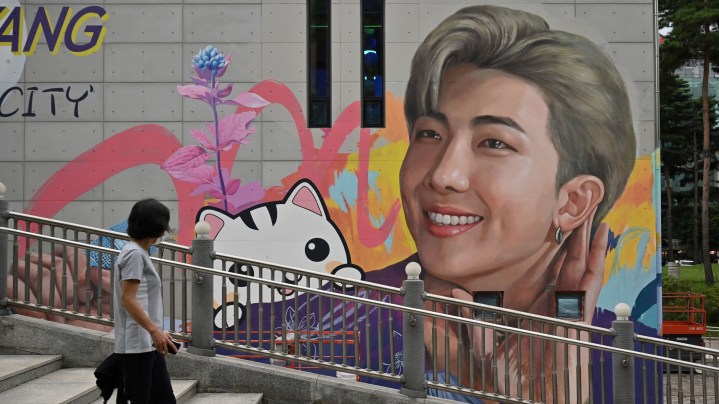
How Korean culture became a global phenomenon

At a tiny storefront in downtown Manhattan, New York, lives a skin care lover’s paradise called oo35mm. The shop is the size of a hallway, stocked floor to ceiling with South Korean lotions and potions. Manager Winnie Zhong said her favorites include Dr. Ceuracle Vegan Kombucha Tea Essence (with real kombucha tea), snail mucin (actual snail slime) and Angel Shark (which is shark-free).
When the store opened a decade ago, most customers were of Asian descent. Now, shoppers of all backgrounds stop in.
Cate Urena was looking for a cleanser and sheet masks. She got into Korean skin care after watching K-dramas. “That kind of like sparked interest, right? So, like, once you have a peek, I think, into the culture, you can expand in so many ways,” she said.

The world has been going a bit crazy for Korean culture. The Netflix drama “Squid Game” skyrocketed to popularity. Its creator, by the way, said there will be a season two. Last year, “Parasite” became the first non-English-language film to take home the Oscar for best picture. There’s also K-pop (think bands like BTS) and kimchi. Korean culture has made such an impression that 26 Korean words were recently added to the Oxford English Dictionary. One of those words, “hallyu,” translates to “Korean wave” — coined to describe global interest in the country.
South Korea’s growing cultural power didn’t happen overnight. It’s been decades in the making.
“Starting in the mid-1990s, the Korean government made an effort to bring the cultural industries as part of the national economy,” said Dal Yong Jin, the author of “Transnational Hallyu.”
South Korea’s economy at the time relied mostly on conglomerates like Samsung and Hyundai, brands the government helped create. So, the government goes to these corporations and asks them to help fund the entertainment industry. Part of the pitch is that Samsung and Hyundai will benefit, too.
“The spillover of popular culture is everything,” Jin said. “Because of popular culture, they like Korea, they like Korean product, like their smartphones, like their semiconductors. The influence is big.”
That cultural influence can help Korea sell makeup, fashion and food the way the U.S. sells Coca-Cola and Levi’s jeans.
So, Samsung and Hyundai start their own film and TV companies. At first, the goal is to get East Asia hooked. And it works, leading to more investment in entertainment, especially K-pop. Music labels open boarding schools to groom teen superstars. The government creates a ministry of culture and ends censorship laws that forbid Korean artists from singing in English. K-pop grows right as social media explodes. And in 2012, Psy’s “Gangnam Style” becomes the first video to break 1 billion views on YouTube.
K-pop “has just the right balance of local elements and global elements, something familiar and something strange. And I think the mix of that is very attractive,” said Suk-Young Kim, a professor at the School of Theater, Film & Television at the University of California, Los Angeles.
She said K-pop’s quirky, bubblegum vision of Korean youth sparked global curiosity in Korean culture. And it helped prepare people’s palates for more complex portrayals of Korean life: Think dystopian dramas like “Parasite” and “Squid Game.” These stories explore a growing wealth gap in a country that rebuilt itself after war and military dictatorship.
This history is a key reason that other cultures have been so receptive to Korean entertainment, Kim said.
“Korea being kind of mid-power has its own benefits,” she said. “You know, it is not small so that it has no resource to support soft power, nor has it been a superpower to create this emotional and cultural resistance.”
South Korea seems to be on its way to becoming a superpower, at least culturally. Today, entertainment is one of the country’s fastest-growing exports. It’s worth $10 billion, just one-tenth of its semiconductor exports.
But the rising influence of Korean culture? That’s priceless.
There’s a lot happening in the world. Through it all, Marketplace is here for you.
You rely on Marketplace to break down the world’s events and tell you how it affects you in a fact-based, approachable way. We rely on your financial support to keep making that possible.
Your donation today powers the independent journalism that you rely on. For just $5/month, you can help sustain Marketplace so we can keep reporting on the things that matter to you.

















